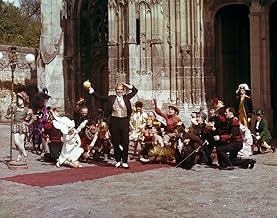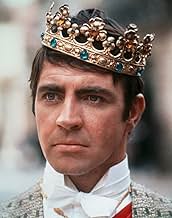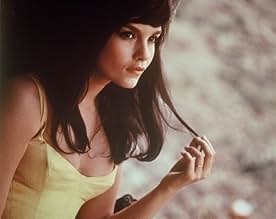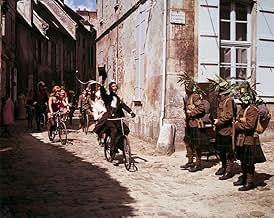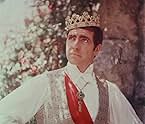CALIFICACIÓN DE IMDb
7.3/10
4.6 k
TU CALIFICACIÓN
Durante la Primera Guerra Mundial, un soldado británico, enviado a una ciudad francesa para buscar la presencia del enemigo, es confundido con un rey por pacientes de un manicomio.Durante la Primera Guerra Mundial, un soldado británico, enviado a una ciudad francesa para buscar la presencia del enemigo, es confundido con un rey por pacientes de un manicomio.Durante la Primera Guerra Mundial, un soldado británico, enviado a una ciudad francesa para buscar la presencia del enemigo, es confundido con un rey por pacientes de un manicomio.
- Dirección
- Guionistas
- Elenco
Pier Paolo Capponi
- Un Officier Anglais
- (as Paolo Capponi)
Georges Adet
- L'aliéné-docteur
- (sin créditos)
Jackie Blanchot
- Le Gabalou
- (sin créditos)
Robert Blome
- Un aliéné
- (sin créditos)
Jean-Marie Bon
- Un aliéné
- (sin créditos)
- Dirección
- Guionistas
- Todo el elenco y el equipo
- Producción, taquilla y más en IMDbPro
Opiniones destacadas
Perhaps I am biased because the female lead, Genevieve Bujold (Coquelicot / Poppy) reminds me of a young French girl whom I fell in love with, and then lost, 40 years ago - the very same year that I first saw the film (1966 or early 1967).
But personal memories apart, it is stunning to watch how French director Philippe de Broca managed to fuse hilarious fun and melancholy reflection in a mold that is an incredible mixture. There is fairy tale, commedia dell'arte, circus, slapstick, comedy, romance - and World War I carnage. Among the supporting roles, the cast features some of the foremost French actors of those times; and it is obvious that they enjoyed every bit of it, especially as they put in a number of biting quips along with marvelous cameos.
This is what happens: For one day Private Charles Plumpick (Alan Bates) becomes, rather against his will, the mock king of a group of lunatics. This motley crowd have escaped from their asylum and have temporarily taken possession of a deserted town in Northern France between the 1918 front lines. Eventually Plumpick owes it to his lunatic friends that he survives when his Scottish battalion and their German counterpart meet in battle. There seems to be no way out of the madness of war. But don't miss the penultimate scene! (Rumour has it that it was censored in the American version at the time...)
My favorite scene is when young, innocent Coquelicot takes the shortest way from the brothel (well - it's a French film, isn't it?) to the town hall to meet her loved one, the King of Hearts - using two telegraph wires as a tightrope.
Why the film was a flop in its own country, and why neither a DVD or at least a video tape is available in France, I simply do not understand. Is it because only the French speak French but the Scots speak English and the Germans speak German? (Note de Broca himself, very early in the film, in a 5 second cameo as Private Adolf Hitler!) No need to worry - there are subtitles to help you along. Actually the DVD recently on sale in the USA *is* the original French version! Subtitled, and uncensored, to be sure.
I cannot deny that the film does have its shortcomings. The story is somewhat inconsistent, there seem to be goofs galore, continuity is lousy. But then it seems that de Broca had to make do with a lousy budget, too. And what he has created is essentially a dream which opposes to the nightmare of war a vision of humanity. In such dreams inconsistency, goofs and lousy continuity do not really matter. So it is still 10 out of 10.
But personal memories apart, it is stunning to watch how French director Philippe de Broca managed to fuse hilarious fun and melancholy reflection in a mold that is an incredible mixture. There is fairy tale, commedia dell'arte, circus, slapstick, comedy, romance - and World War I carnage. Among the supporting roles, the cast features some of the foremost French actors of those times; and it is obvious that they enjoyed every bit of it, especially as they put in a number of biting quips along with marvelous cameos.
This is what happens: For one day Private Charles Plumpick (Alan Bates) becomes, rather against his will, the mock king of a group of lunatics. This motley crowd have escaped from their asylum and have temporarily taken possession of a deserted town in Northern France between the 1918 front lines. Eventually Plumpick owes it to his lunatic friends that he survives when his Scottish battalion and their German counterpart meet in battle. There seems to be no way out of the madness of war. But don't miss the penultimate scene! (Rumour has it that it was censored in the American version at the time...)
My favorite scene is when young, innocent Coquelicot takes the shortest way from the brothel (well - it's a French film, isn't it?) to the town hall to meet her loved one, the King of Hearts - using two telegraph wires as a tightrope.
Why the film was a flop in its own country, and why neither a DVD or at least a video tape is available in France, I simply do not understand. Is it because only the French speak French but the Scots speak English and the Germans speak German? (Note de Broca himself, very early in the film, in a 5 second cameo as Private Adolf Hitler!) No need to worry - there are subtitles to help you along. Actually the DVD recently on sale in the USA *is* the original French version! Subtitled, and uncensored, to be sure.
I cannot deny that the film does have its shortcomings. The story is somewhat inconsistent, there seem to be goofs galore, continuity is lousy. But then it seems that de Broca had to make do with a lousy budget, too. And what he has created is essentially a dream which opposes to the nightmare of war a vision of humanity. In such dreams inconsistency, goofs and lousy continuity do not really matter. So it is still 10 out of 10.
De Broca's delightful and surreal anti-war fantasy quickly attained a cult status when it was first released, but in recent years it has dropped more and more out of sight. A shame, because it is a charming film, the whimsical, romantic nature of which is entirely French. Even though the underlying message, that of preferring one kind of insanity to another is a simple, absurdist one, the viewer is still carried along by the Gaullic charm of it all.
As the much-put-upon martial ornithologist, It's not just because Bates is the only English member of the cast that one is aware of some awkwardness in his casting. For English cinema goers in particular, familiar with his career, his usual jocular masculinity is hard to reconcile with an child-like character, swept along by events. Those who remember Bates and Oliver Reed wrestling nude in 'Women in Love' (1962) from the same period, or his cocky Vic in 'A Kind of Loving' (1962), may bulk at Bates portraying such a confused innocent. Having said that, Bates' actual performance is balanced and restrained, all of a piece with the rest of the cast.
'King of Hearts' is primarily an ensemble piece. Many of the film's most delightful moments spring from the fancy-filled and flirtatious lunatics who quickly fill the streets, shops and occupations left by the fleeing villagers, their interaction with each other, and Plumpick. This world of fantasy is curtailed by the village walls, which physically as well as mentally encircle their environment. Outside is reality (no matter how ludicrously it is presented), conflict, death. Inside the walls is harmony of sorts, life celebrated. This distinction between outside and inside is made clear in the film. As soon as Plumpick attempts to ride a horse back into the real world for help, the music and the mass accompaniment of him by the inmates has to end until he is obliged to return.
As the 'King of Hearts' Plumpick is at the center of his motley 'people', as well as of Coquelicot's (Geneviève Bujold) affections. Once he awards himself his name, in a panic and on the run, his 'subjects' call out for him. He is promptly 'crowned' (both by banging his head, inducing his initial confusion, and though acquiring his 'kingship'). He is awarded a bride, and accepted as an unique traveller into the society of the amiably mad. Their acceptance of him anticipates the final scene of the film, when a chastened Plumpick re-admits himself into their company, having rejected the larger insanity of warfare.
It's fitting in a way that the least successful parts of the film lay outside of the village, where comic stereotypes replace whimsy and the comedy is drawn with much broader strokes. In particular Colonel MacBibenbrook (Adolfo Celi, better known as Emil Largo in 'Thunderball') is uncomfortably close to parody, and his part would have been much better cast with an actor like Trevor Howard who could excel with a line in ironic bombast. The Germans fare no better and, although amusing and lightweight in their capers, one misses the delicacy with which the lunatics are portrayed. One suspects that De Broca associates more with the geniality of the insane, as we all do given the options, and this sympathy is reflected on screen
Tellingly, the lunatics are not completely oblivious to the hostile world which surrounds them, although they are content to ignore the immediate threat of destruction and Plumpick's warnings. At the end of the film, once the opposing forces have symbolically destroyed themselves, Marcel says:'I'm tired of this game, let's go back to our rooms'. With deliberate sadness, they divest themselves of their play robes and return to their asylum, a divestment scene at the same time quiet, serious and eminently sane. It is clear that they are mad - but not crazy.
As the much-put-upon martial ornithologist, It's not just because Bates is the only English member of the cast that one is aware of some awkwardness in his casting. For English cinema goers in particular, familiar with his career, his usual jocular masculinity is hard to reconcile with an child-like character, swept along by events. Those who remember Bates and Oliver Reed wrestling nude in 'Women in Love' (1962) from the same period, or his cocky Vic in 'A Kind of Loving' (1962), may bulk at Bates portraying such a confused innocent. Having said that, Bates' actual performance is balanced and restrained, all of a piece with the rest of the cast.
'King of Hearts' is primarily an ensemble piece. Many of the film's most delightful moments spring from the fancy-filled and flirtatious lunatics who quickly fill the streets, shops and occupations left by the fleeing villagers, their interaction with each other, and Plumpick. This world of fantasy is curtailed by the village walls, which physically as well as mentally encircle their environment. Outside is reality (no matter how ludicrously it is presented), conflict, death. Inside the walls is harmony of sorts, life celebrated. This distinction between outside and inside is made clear in the film. As soon as Plumpick attempts to ride a horse back into the real world for help, the music and the mass accompaniment of him by the inmates has to end until he is obliged to return.
As the 'King of Hearts' Plumpick is at the center of his motley 'people', as well as of Coquelicot's (Geneviève Bujold) affections. Once he awards himself his name, in a panic and on the run, his 'subjects' call out for him. He is promptly 'crowned' (both by banging his head, inducing his initial confusion, and though acquiring his 'kingship'). He is awarded a bride, and accepted as an unique traveller into the society of the amiably mad. Their acceptance of him anticipates the final scene of the film, when a chastened Plumpick re-admits himself into their company, having rejected the larger insanity of warfare.
It's fitting in a way that the least successful parts of the film lay outside of the village, where comic stereotypes replace whimsy and the comedy is drawn with much broader strokes. In particular Colonel MacBibenbrook (Adolfo Celi, better known as Emil Largo in 'Thunderball') is uncomfortably close to parody, and his part would have been much better cast with an actor like Trevor Howard who could excel with a line in ironic bombast. The Germans fare no better and, although amusing and lightweight in their capers, one misses the delicacy with which the lunatics are portrayed. One suspects that De Broca associates more with the geniality of the insane, as we all do given the options, and this sympathy is reflected on screen
Tellingly, the lunatics are not completely oblivious to the hostile world which surrounds them, although they are content to ignore the immediate threat of destruction and Plumpick's warnings. At the end of the film, once the opposing forces have symbolically destroyed themselves, Marcel says:'I'm tired of this game, let's go back to our rooms'. With deliberate sadness, they divest themselves of their play robes and return to their asylum, a divestment scene at the same time quiet, serious and eminently sane. It is clear that they are mad - but not crazy.
The King of Hearts should be seen by a new generation of viewers now in the
summer of 2004. This is a great fable--which during the 1980s might have
seemed dated, but now is more relevant than ever. It is a great meditation on war. As a movie, the circus-like atmosphere and characters combine to form a grand entertainment. We get seduced by the world of childlike imagination and sense of wonder we see in the inmates. We embrace them. Great
philosophical moments abound--all surrounded by beautiful colors, wonderfully funny moments and a gorgeous music score. The final scene is such a classic-- and takes the audience by such surprise--one goes out of the film absolutely
exhilarated. A funny, charming and ultimately profound film.
summer of 2004. This is a great fable--which during the 1980s might have
seemed dated, but now is more relevant than ever. It is a great meditation on war. As a movie, the circus-like atmosphere and characters combine to form a grand entertainment. We get seduced by the world of childlike imagination and sense of wonder we see in the inmates. We embrace them. Great
philosophical moments abound--all surrounded by beautiful colors, wonderfully funny moments and a gorgeous music score. The final scene is such a classic-- and takes the audience by such surprise--one goes out of the film absolutely
exhilarated. A funny, charming and ultimately profound film.
One of the biggest cult films of the 60s and 70s* is now back for a brief theatrical run on it's way to Blu Ray and Streaming courtesy of a new 4K Restoration by the Cohen Media Group to commemorate its 50th Anniversary. The restoration looks fine, if not extraordinary (it may look better on Blu-Ray since most theaters will be showing it via 2K DCP).
Reviewing the film for the first time is a bit tricky in light of its formidable cult history. At the time, it's success was often chalked up to as a counter-culture commentary on the insanity of the Vietnam War. By the 80s and 90s, KING got tabbed as 'of its time' and 'dated' (a term I despise).
In 2018? With distance, one can look at it as the timeless fable it always was at its core. A British soldier Plumpick (Alan Bates) is sent to a small German occupied village in WWI on a spy mission. Unbeknownst to the Allied forces, the village has already been evacuated and the Germans have also left (leaving a nasty surprise behind). In a bizarre turn of events, the village's only inhabitants are the patients at an insane asylum. The patients soon dub Plumpick their de facto ruler - 'The King of Hearts'. Not content with just a 'King', the patients dress up and become characters of their own - everything from Dukes and Duchesses, to Prostitutes and Madams. A particularly winsome lass, Coquelicot (Genevieve Bujold) is presented as a possible Queen to the 'King'.
There is much frivolity and preciousness on hand, much of it entertaining, and much of it cloying (and all of it will be found offensive to many people offended at its portrayal of the mentally ill). De Broca's direction and the script by Daniel Boulanger and Maurice Bessy moves in fits and starts. How enjoyable one finds it will depend on one's tolerance for such whimsy. The performances are energetic and its no wonder Bujold (in her yellow tutu) soon became an international name.
The film's message that the insanity of war would be no different with the actual 'insane' in charge (if not better off!) is facile, of course, but, one can see how it would have had resonance during a time of war, protest, assassinations and such. It's like Renoir's RULES OF THE GAME as played by mad fools. But, rather than just saying it's 'dated' and 'of its time' (just as facile, in my book), its better to just look at KING OF HEARTS as fairy-tale for all times. * After not doing much business in its initial run, KING OF HEARTS had a legendary 4 to 5 year run (depending on the source) at the now defunct Central Square Cinemas in Boston. During that period it spread to midnight shows, college campuses and revival houses across the country. It remained in regular revival house distribution into the 80s.
Reviewing the film for the first time is a bit tricky in light of its formidable cult history. At the time, it's success was often chalked up to as a counter-culture commentary on the insanity of the Vietnam War. By the 80s and 90s, KING got tabbed as 'of its time' and 'dated' (a term I despise).
In 2018? With distance, one can look at it as the timeless fable it always was at its core. A British soldier Plumpick (Alan Bates) is sent to a small German occupied village in WWI on a spy mission. Unbeknownst to the Allied forces, the village has already been evacuated and the Germans have also left (leaving a nasty surprise behind). In a bizarre turn of events, the village's only inhabitants are the patients at an insane asylum. The patients soon dub Plumpick their de facto ruler - 'The King of Hearts'. Not content with just a 'King', the patients dress up and become characters of their own - everything from Dukes and Duchesses, to Prostitutes and Madams. A particularly winsome lass, Coquelicot (Genevieve Bujold) is presented as a possible Queen to the 'King'.
There is much frivolity and preciousness on hand, much of it entertaining, and much of it cloying (and all of it will be found offensive to many people offended at its portrayal of the mentally ill). De Broca's direction and the script by Daniel Boulanger and Maurice Bessy moves in fits and starts. How enjoyable one finds it will depend on one's tolerance for such whimsy. The performances are energetic and its no wonder Bujold (in her yellow tutu) soon became an international name.
The film's message that the insanity of war would be no different with the actual 'insane' in charge (if not better off!) is facile, of course, but, one can see how it would have had resonance during a time of war, protest, assassinations and such. It's like Renoir's RULES OF THE GAME as played by mad fools. But, rather than just saying it's 'dated' and 'of its time' (just as facile, in my book), its better to just look at KING OF HEARTS as fairy-tale for all times. * After not doing much business in its initial run, KING OF HEARTS had a legendary 4 to 5 year run (depending on the source) at the now defunct Central Square Cinemas in Boston. During that period it spread to midnight shows, college campuses and revival houses across the country. It remained in regular revival house distribution into the 80s.
I saw King of Hearts on its original release when I was 15. For 35 years it has remained one of my favourite movies; perhaps the number one. Nothing in particular about the film so qualifies it. I like quite a number of "better" films, but KOH touched me in a way that stuck. It is an authentic movie; the reality is as simple as the english speaking english, the french french, and the germans german. The crazy people are sane, the sane people crazy. It is funny and tragic and perhaps a little too quirky but ... if you haven't tried it on you should.
¿Sabías que…?
- TriviaWhile the film was a flop with critics and audiences in France, it was an unexpected cult success in the USA, running for years in Boston repertory film houses circa 73-76. Midnight showings around the country made it an early cult film, like El show de terror de Rocky (1975), Cabeza de borrador (1977), El Topo (1970), Más allá del valle de las muñecas (1970), etc...
- ErroresThe stairs/ladder Plumpick uses to climb to the top of the blockhouse appear out of nowhere.
- Citas
[last lines]
Le Duc de Trèfle: The most beautiful journeys are taken through the window.
- Créditos curiososThe credits rise and then fall to coincide with the sound of a large clock.
- ConexionesReferenced in Rescatando al soldado Ryan (1998)
- Bandas sonorasLa Valse Tordue
Written and Performed by Georges Delerue Et Son Orchestre
Selecciones populares
Inicia sesión para calificar y agrega a la lista de videos para obtener recomendaciones personalizadas
- How long is King of Hearts?Con tecnología de Alexa
Detalles
- Fecha de lanzamiento
- Países de origen
- Idiomas
- También se conoce como
- King of Hearts
- Locaciones de filmación
- Senlis, Oise, Francia(insane asylum and town square scenes, Senlis is 55 km north of Paris)
- Productoras
- Ver más créditos de la compañía en IMDbPro
Taquilla
- Total en EE. UU. y Canadá
- USD 17,646
- Fin de semana de estreno en EE. UU. y Canadá
- USD 3,443
- 25 feb 2018
- Total a nivel mundial
- USD 18,130
Contribuir a esta página
Sugiere una edición o agrega el contenido que falta

Principales brechas de datos
What is the Italian language plot outline for Rey de corazones (1966)?
Responda

![Trailer [OV]](https://m.media-amazon.com/images/M/MV5BOTgyNWQ0NTctZWY1Mi00NzY1LTljNWItMWFlNjI2MDMzM2NmXkEyXkFqcGdeQXRyYW5zY29kZS13b3JrZmxvdw@@._V1_QL75_UY281_CR79)

